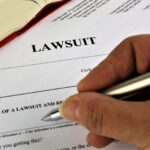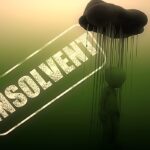You Should Not Put Your Head in the Sand If You Are in a lawsuit

You cannot simply ignore a lawsuit brought against you because you do not want to participate or you do not know what to do. Once an action is filed, and you are served with the initiating documents, namely a Summons and Complaint, the clock starts ticking on your time to respond. The consequences of failing to respond are severe. If you fail to respond, the person seeking to recover against you may obtain a Default Judgment, awarding the damages sought.
This is exactly what happened to the defendants in the recent case of BMO Harris Bank, ...
Read More....New Jersey Slip and Fall Victim Strikes Out on Appeal

In the recent New Jersey Appellate Division case of Quejada v. ShopRite, the Court affirmed the dismissal of the slip and fall victim had a case and the personal injury plaintiff’s case against a supermarket.
The plaintiff in Quejada was approaching the cash register area of a ShopRite when she slipped and fell. The plaintiff did not notice anything on the ground that would have caused the fall but eventually realized that her clothes were wet after the fall. The plaintiff’s daughter, who was shopping with her, did not see the plaintiff...
Read More....New Jersey Personal Injury Plaintiff Barred by Tort Claims Act

The New Jersey Appellate Division’s recent decision in the case of Anthony v. Newark Housing Authority is a cautionary tale for personal injury victims injured on government property who fail to file a timely notice of claim. The NJ Tort Claims Act requires plaintiffs to file a “tort claims notice” within 90-days of an accident in which the government is a defendant.
The plaintiff in Anthony tripped and fell over a large gap in a sidewalk while walking through a residential complex owned and operated by defendants, breaking her leg. ...
Read More....Insolvent Estates in New Jersey: What You Need to Know When the Estate Has No Money

One important responsibility for the executor or administrator of a New Jersey estate is to deal with insolvent estates, that means to pay the deceased person’s debts. Debts can include credit cards, mortgages, loans, funeral costs, and medical expenses among other things. Some creditors may make formal claims against the estate while others may forgive the debt. The executor/administrator must use the assets of the estate to pay the decedent’s debts, but they do not have to use their own personal funds to satisfy the debts. What happens...
Read More....Specificity is Key in Estate Planning

A Will and other estate planning documents provide you with the opportunity to make decisions that will affect your loved ones and beneficiaries after you have left this earth. You decide who gets what and you decide how much each person gets. You can even decide to leave something or everything to charity. A Will allows you the final say over the distribution of property and belongings you leave behind.
When making these decisions, it is important to be clear and specific as to how you want your items distributed. Ambiguous language in ...
Read More....Do You Have a Will? You Should.

Do You Have a Will? You Should. No one enjoys talking about death, but it is an inevitable fate everyone will eventually face. Having your affairs in order through the drafting of a Last Will and Testament will help to ease the stress in administering your estate.
A Will is an organized document that outlines your wishes and desires for your probate assets. Your Will gives you the control to designate to who your assets are distributed from your estate upon your passing.
Before preparing a Will, you want to take inventory of your assets. It...
Read More....Commercial Property Owners: Are You Responsible to Remove Snow and Ice During an Ongoing Storm?

Winter is right around the corner. It is not always clear during New Jersey winters when a storm may occur or how much snow, sleet, and/or ice will hit the ground. Sometimes it is predicted to snow less than an inch and we end up with a foot of snow or perhaps freezing rain. With winter conditions being so unpredictable, commercial property owners may have a difficult time determining when is the appropriate time to remove snow and ice or apply salt to the areas surrounding their properties.
Commercial property owners may be under the impression...
Read More....Ancillary Probate: Are additional steps required to sell a decedent’s property located in another state?

Handling the loss of a loved one is already a difficult time, but there can be additional stress if you find yourself appointed as executor in the decedent’s Will, or you must apply to be an administrator if there is no Will. Probate is the court-supervised process an executor or administrator takes in settling a decedent’s estate. The probate process can become even more complicated if the decedent owned property outside of the state in which they resided and ancillary probate is required.
Ancillary probate is the probate process ...
Read More....Aggravation of a Pre-Existing Condition in New Jersey Personal Injury Cases

Ever wonder why opposing counsel or your adjuster is fixating on your prior injuries, even those that you yourself have forgotten about? It is because an aggravation of a pre-existing condition, as opposed to causing a new injury, generally results in lower damages received by the injured party. Typically, this is due to the difficulty a jury may have in determining which party should be liable and how much of the injury was due to the subsequent accident.
There are different types of damages a personal injury claimant may recover, most...
Read More....New Jersey Law Regarding Waiver of Attorney-Client Privilege Amended

Much like the protections afforded to a patient seeking treatment from a physician, clients who meet with attorneys for legal services are afforded professional privileges, as well. Namely, when dealing with an attorney, client information may be shielded by the work-product doctrine and attorney-client privilege.
Simply stated, the work-product doctrine shields tangible materials prepared in anticipation of litigation from discovery by opposing counsel. The attorney-client privilege, on the other hand, protects written...
Read More....